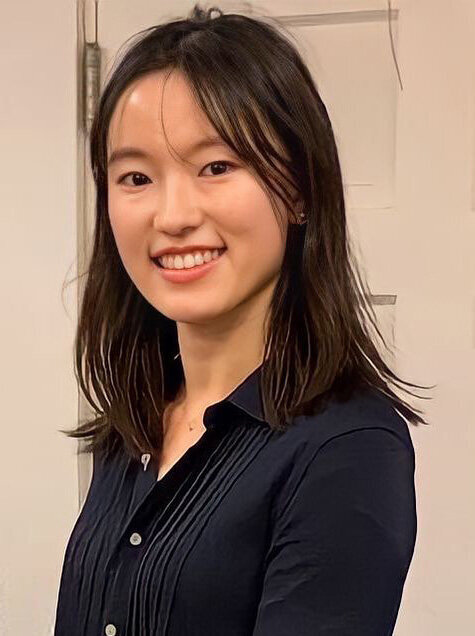Master’s Program (Second Year Graduate Student), Harvard University
June 2020 B.A., Division of Arts and Sciences, College of Liberal Arts (Major: History, Minor: Chemistry)
Encountering the Path of Research in the Liberal Arts
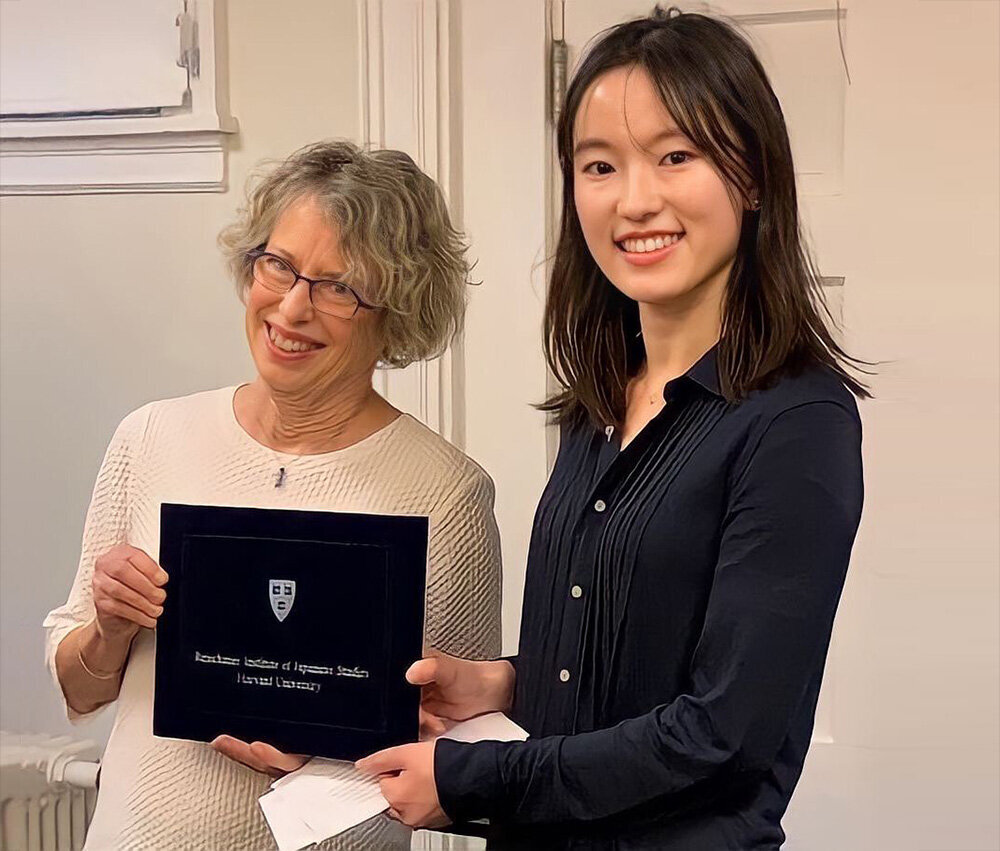
To further my graduate thesis work from ICU, I am now devoting myself to research at the Harvard University Graduate School of Arts and Sciences
I am currently working towards an MA at the Regional Studies-East Asia (RSEA) Program at Harvard University, specializing in the modern and contemporary history of Japan and Korea. My historical research is focused on a cultural and social history of the Japanese empire, with a regional focus on colonial Korea. With the rise of post-colonialism in the late 20th century, explorations of the intricate, multifarious ways in which colonialism penetrates the everyday, the cultural and social dimensions of our lives, has become central to historical studies. I situate my own research in this thread, where my examination of the cultural representations of imperial Japan and colonial Korea is intimately tied to my interest in understanding how colonialism has configured and continues to configure identities such as race and gender in Japan and Korea.
Growing up in Japan, I developed a strong interest in Korean popular culture. I spent my adolescent years immersed in K-Pop and Korean TV dramas, through which I quite naturally, acquired proficiency in the Korean language. While I was aware of the history of Japanese colonialism in Korea, I was shooked at my lack of awareness of the complexities and long-lasting afterlives of Japanese imperialism, when I took a course on modern Japanese history with Professor Robert Eskildsen at ICU. This developed into a strong desire to more deeply understand Japanese colonialism, which I also found my own identity, as a Japanese-Chinese-American with an abiding interest in Korean culture, also implicated in.
As a starting point, for my senior thesis at ICU, I decided to analyze Japanese "visual" representations of Korea and Koreans in the colonial period, utilizing visual materials such as postcards, travelogues, and manga. In my senior thesis titled "The Japanese Gaze Towards Colonial Korea in Visual Representation and the Colonial Rhetoric, 1905-1937," I closely examined the power dynamics embedded in Japanese "gazes" towards Korea, particularly focusing on how they were constituted in the visual mode, and demonstrated how these relationships shifted in the second decade of Japanese colonial rule.
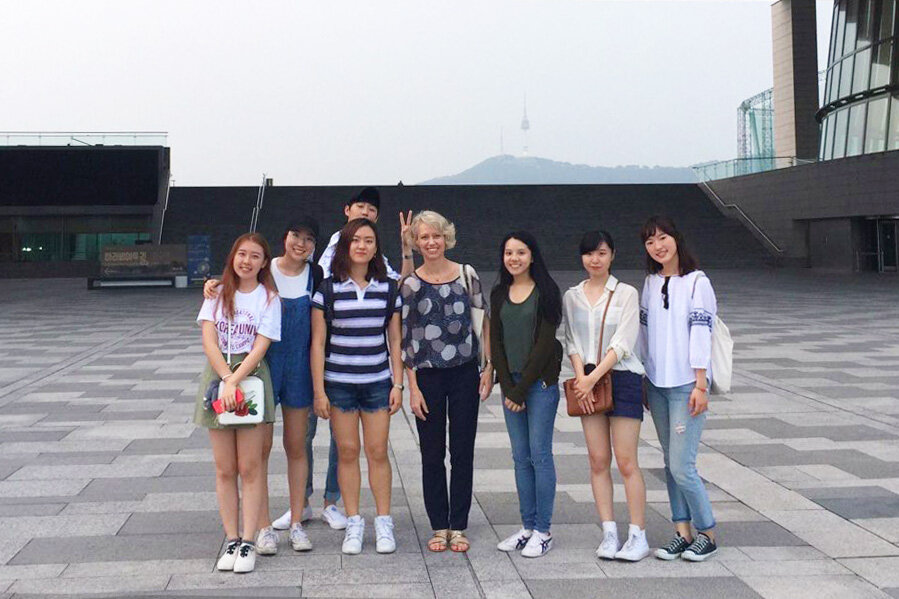
Korea University International Summer Campus[2017]
In many ways, my master's thesis research a Harvard University expands on this inquiry into configurations of colonial relationships through cultural representation. However, going beyond the colonial gaze of Japanese towards Koreans, I have been exploring "colonial tourism" as a lens into the ways Japanese and Koreans experienced, negotiated, and navigated the often contradictory, ideologies and cultural spaces of the Japanese empire. My initial inquiry was sparked by an encounter with a colonial-period tour magazine titled Kankō Chōsen [Tourism Korea, 1939-1944]. Published by the colonial Korean branch of the Japan Tourist Bureau (present-day JTB) in 1939 -- at the height of the Sino-Japanese War -- I noticed that the officials and ideologues of the colonial state were promoting Japanese tourism in Korea to a new degree during the wartime. First of all, why promote colonial tourism during the war? Second, why promote "Korean" culture at a time conventionally understood as a period where Koreans were forced to "radically assimilate" to Japan?
My findings revealed that, contrary to the common understanding of wartime colonial Korea as one in which culture was downplayed in light of political and economic concerns, the colonial state and its ideologies recognized "culture (bunka/munhwa)" as a particularly important force, in its attempt to unify Japanese colonizers and colonizing Koreans under a singular category of identification as "imperial subjects (kōkoku shinmin)." Tourism served as the vehicle for this end. I closely examined two spaces in colonial Korea that exemplified this cultural strategy of wartime imperial Japan. One was Puyo in South Ch'ungch'ŏng province, the last capital of the ancient Paekche kingdom of Korea, where the ancient history of Japan-Korea relations was revived and re-represented by imperial Japan as the "sacred site (seichi)" of "Japan and Korea as One Body (naisen ittai)." Another was the region known as "Northern Korea (Hokusen)" that loosely signified North and South Hamgyong provinces. Although relatively under-examined, Northern Korea became central to the imperial imagination when the spatial configuration of the empire shifted after the establishment of Manchukuo in 1932. Tours to Northern Korea were promoted by the imperial state as a way of experiencing the changing realities of "Korea" as a new center of industrialization, as well as a gateway to the expanding frontiers of the Japanese empire in Manchuria and beyond. This latter chapter began as a seminar paper I wrote in a course I wrote with Professor Andrew Gordon, and which subsequently received the 2022 Noma-Reischauer Prize. In the full thesis, I also unpack the complexities of the colonial interactions of Japanese and Koreans in these tour spaces, such as the ways Koreans "gazed back" at touring Japanese, and the ways the imperial appraisal of "Korean" culture allowed at least some Koreans to utilize these contradictory schisms for their own ends.
The Harvard Yenching Library at Harvard University has by far one of the best collections of historical materials on East Asia in the United States. I cannot adequately express in words the sense of pure excitement I felt as I walked through the shelves and shelves of materials for the first time, especially the unique mixture of rare primary historical materials and secondary sources. These materials are the very basis of my research, and I sincerely appreciate the opportunity to be able to utilize them. Furthermore, I am indebted to my current advisors, Professor Andrew Gordon and Professor Carter Eckert, experts on modern Japan and Korea respectively, for their historiographical and historical perspectives that have allowed me to pursue a transnational perspective in my research.
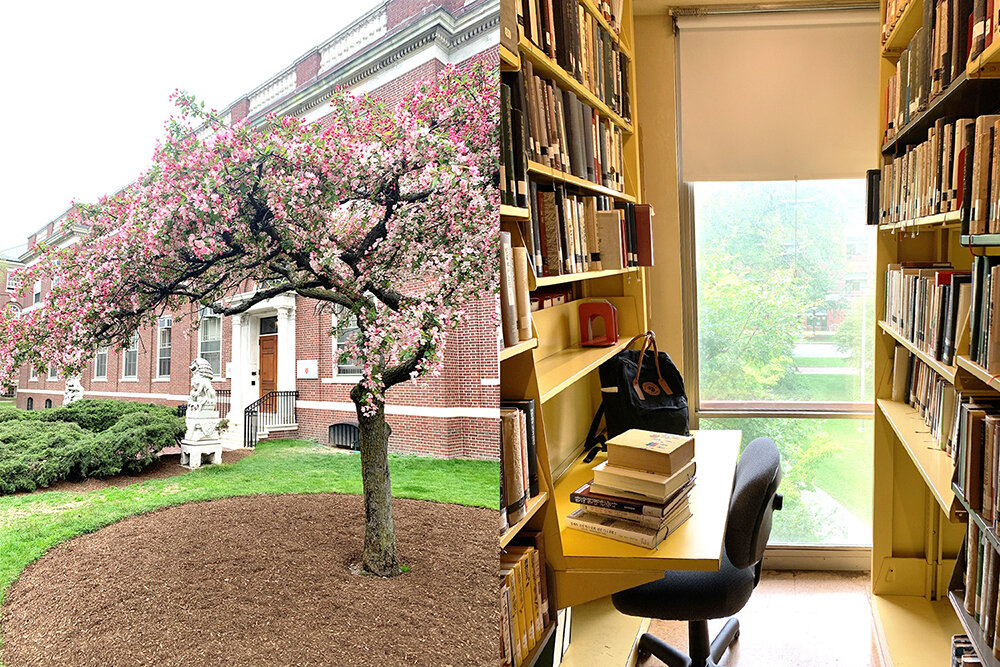
Harvard University Yanjing Library and Carrels in the Library
Unique research themes discovered through interdisciplinary study
Growing up, my favorite subjects were biology, history, and art. However, in high school, I felt uncomfortable that I had to choose between the "arts (bunkei)" and "natural sciences (rikei)," as if they were mutually exclusive subjects. This became the bud of a desire to study at a college where I could explore my interdisciplinary interests. I could think of nowhere else than ICU. ICU appealed to me for multiple reasons. The two main reasons were: first, that the liberal arts curriculum would allow me to freely pursue my interdisciplinary interests without deciding on a specific major prior to matriculation. Second, that I could continue my bilingual education, taking courses in both English in Japanese.
Since I had attended ICU High School, I thought I had known ICU quite well, but the college education really exceeded my expectations, and I could easily say that it was one of my best choices. As if filling in on my desire to study subjects in both the humanities and natural sciences, I took courses in biology, chemistry, history, art history, among others, freely in the first two years of my college experience. Eventually, I narrowed down my interests to two subjects: history and chemistry, which I ended up doing a major/minor in.
Prior to college, we tend to study subjects because they are compulsory. But my college experience at ICU, really allowed me to explore subjects that had never really entered my radar previously, and let go of my preconceptions. Chemistry, for example, was not my favorite subject in high school, or actually, one of my least favorite ones, but something that I came to really appreciate when I learned to think like a chemist and obtained a perspective in understanding our material world.
This experience nourishes and continues to filter into my research. While conventionally, the study of history has tended to be text-centric, recently historians have been exploring other forms of representation, including popular and visual culture. I could contribute to these new developments in the field, because I had an interdisciplinary education in art and chemistry, which allowed me to pay attention to materials that perhaps were previously not considered objects of serious historical examination. I have often been asked why I take such "round-a-bout" routes, whether it is in applying to college or studying supposedly "random" subjects, but I think it is precisely this, the breadth of experience and varieties of perspectives I obtained at ICU, that continues to enrich my research in unexpected ways.
I am also extremely grateful for the two opportunities I had to study abroad during my years at ICU. If I think about it now, both experiences were turning points toward my current research path. In my second year at ICU, I took part in a summer study program at Korea University in South Korea, something I had wanted to do ever since I enrolled at ICU. This was my first time visiting Korea, but also my first time abroad on my own. I took a Introduction to Korean Art History course, where I visited the national museum. Here, I became acutely conscious of the ways Japanese colonialism impacted not only political and social structures, but also the realm of culture and identity. The experience of a growing sense of self, propelled me to pursue yet another extended opportunity to study-abroad, in the one-year exchange program at the University of California, Berkeley during my junior year. With the mediation of my undergraduate advisor, I was able to become acquainted with a professor who specializes in modern Japanese and Korean history. With his help, I was able to learn what "research" really was. He quite literally took me to the East Asian library and pointed out to me materials, such as colonial-period manga, that became the basis of my undergraduate thesis.
Aside from my academic activities, I also participated in the K-Pop dance "circle," PUCAPASS. We would cover the dance performances of our favorite K-Pop groups, and perform them at school events such as ICU festival. At ICU, I appreciate that I had the time and space to engage in activities and build communities that nourished my life aside from my schoolwork, which I realized is not necessarily true for a lot of college students.
I would like to see more ICU students take advantage of ICU's unique environment to discover what they really want to do
I would like to strongly encourage ICU students to take full advantage of ICU's study environment. The liberal arts curriculum, small class sizes, the focus on discussion-based learning, and the bilingual Japanese-English education, for example, are amazing features that few other universities in Japan can offer. My time at ICU, in a nutshell, was a time of self-discovery. While I had a desire to learn, during my high-school years, I had difficulty figuring out what I really wanted. I was swayed and confused by the overwhelming demands for study that the Japanese education system imposed on students. I did not have the space to figure things out, nor did I have the language to articulate my opinion and feelings. ICU gives you a lot of space to grow and self-reflect, and it has plenty of resources that you can utilize to pursue your interests. I highly recommend that everyone fully takes advantage of these resources and opportunities for personal and intellectual growth. Even if you have a clear idea of what you want to learn in college or pursue as a career post-graduation, I suggest that you do not stick to your preconceptions, but actively challenge them, for example, by taking courses outside of your preconceived boundaries. After all, when else would you have the time and opportunity to explore them? Your college experience is when you can really, without fear of failure, broaden your perspectives and capacities as an individual.
Another unique feature of ICU is the close relationships you can develop with faculty. Growing up, I was a rather shy person, who found it difficult to proactively reach out to others for help, especially in competitive environments. But at ICU, through the small-size discussion-based courses, I was able to naturally cultivate ties with my professors. In this process, I also gradually learned that it was okay to ask for their help, it was okay to express my opinions, and that they were more than willing to provide their resources and support to me. In my junior year, I went through a period when I was unsure about what to do with my future. Around this time, many of my friends were job-hunting, or already secured a job. I knew I wanted to continue to study, but I was not sure how I could go forward with this. I honestly let out my concerns to my advisor in office hours and he suggested that I apply to master's programs abroad. There were very few people applying to graduate schools around me, let alone overseas, so I don't think I would have been able to take on this challenge without the help, advice, and mentorship of my advisor. I am truly grateful to this relationship, which I hope to continue to cultivate in the future.
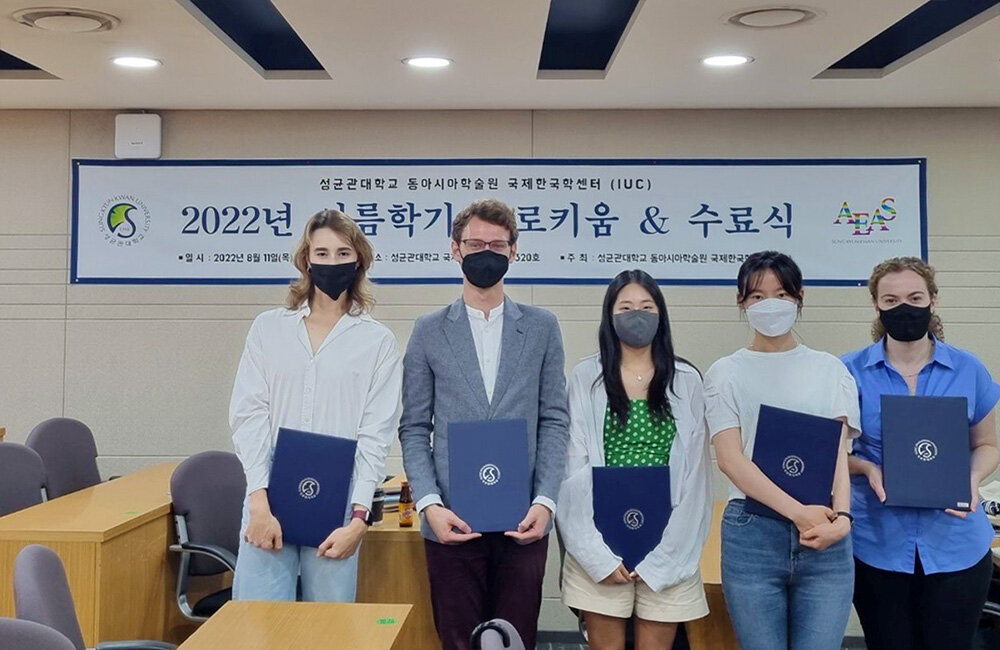
Inter-University Center at Sungkyunkwan University[2022]
I'm happy to report that the research that I began at ICU bore fruit. An essay that I wrote on my research was awarded the Graduate Noma-Reischauer Prize, a prestigious award for Japan-related essay by a graduate student at Harvard University. I am grateful to everyone, my past and current advisors, my friends and family, who has supported me throughout the process, and most of all, to myself and my own efforts.
Moving forward, I am planning to continue my research at the doctoral level. Aside from my historical research, I have recently begun a research project on Japanese women participating in K-Pop, focusing on their strategies of representation and identity construction. I sincerely hope, that through my research, I can contribute to a more nuanced, transnational appreciation of Japanese and Korean history and culture, and more broadly, of East Asia.
(*1) Noma-Reischauer student paper prize / Title of Awarded Paper:
Envisioning and Enacting Imperial Integration: Wartime Tourism in Northern Korea, 1931-1945
In this paper, I examined a relatively under-explored region in colonial Korea -- Northern Korea [Hokusen/Puksǒn, North and South Hamgyǒng provinces] -- that emerged as a space of "imperial" importance in the 1930s with Japan's advancement onto the Chinese continent. I demonstrated how tourism representations transformed the symbolic space of Northern Korea: from the colonial peripheries and "back" of the Japanese empire to a progressive space of Korean militarized industrialization and "front" of a newly integrated Northeast Asian empire centered on the Japan Sea/East Sea. Studying gazes, responses, and thoughts of tourists traveling from western Japan to Manchukuo via Northern Korea, I also attempt to provide a new picture of how Japanese and Koreans simultaneously experienced "war" and "empire" through tourism in spaces of imperial integration.
Profile
Mayako Shibagaki
Master's Program (Second Year Graduate Student), Harvard University
BA, ICU, June 2020
At ICU, she majored in history and minored in chemistry. She wrote her graduation thesis on visual representations of colonial-era Korea. Her graduation research, a deep reading of the relationship between Japan and Korea as a suzerain state and colonial power won the Kiyoko Cho Academic Award in Asian Studies. In September 2021, she was admitted to Harvard University Graduate School Regional Studies-East Asia (RSEA) Program. In 2022, she was a graduate student recipient of the Graduate Noma-Reischauer Prize(*), a prestigious award for the best essay on a Japan-related topic by a graduate student at Harvard University.
